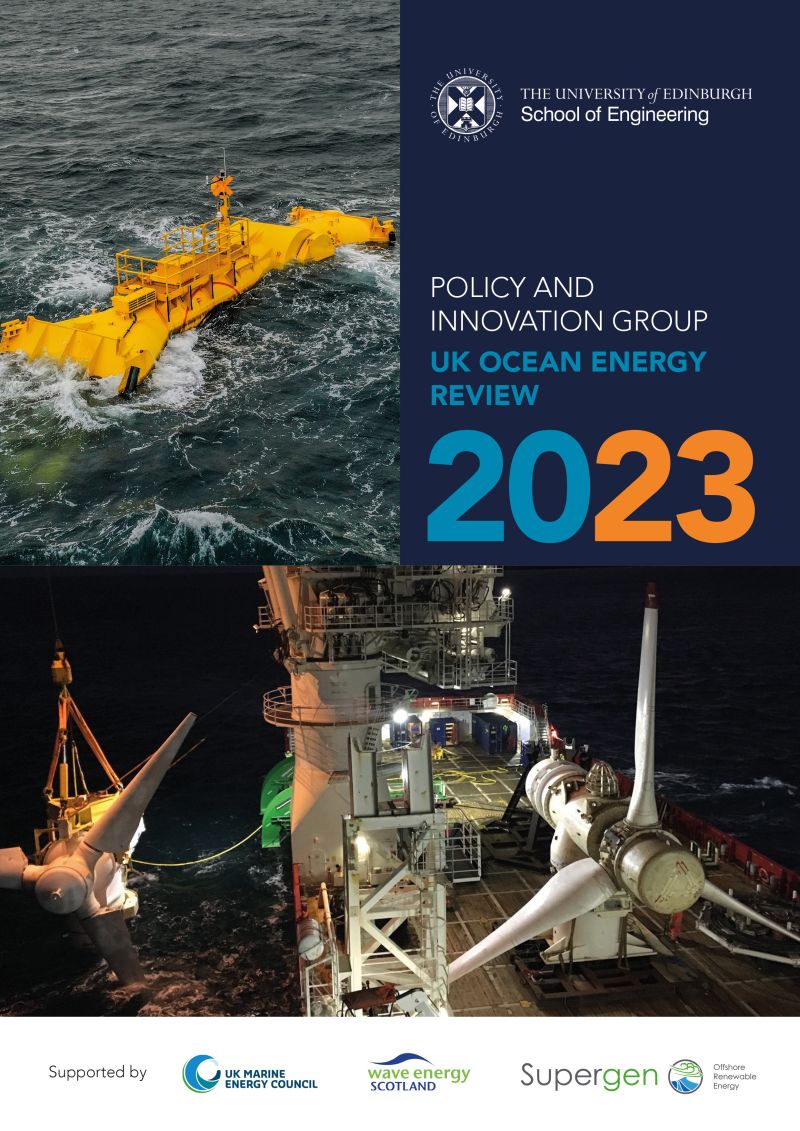A Year of Progress for the UK Ocean Energy Sector
The Policy and Innovation Group at the University of Edinburgh, in collaboration with the Supergen ORE Hub, Wave Energy Scotland and the Marine Energy Council, are pleased to announce the publication of the 2023 UK Ocean Energy Review.
In what has been a transformative year for the ocean energy sector, marked by continued CfD success and the awarding of large-scale European funding, this report provides a concise summary of the UK’s evolving national strategy, the policy support programmes available and the progress made by individual developers and R&I projects. We hope that it provides a platform to guide and inform future investors, policymakers and government officials on the untapped potential that the sector has to offer, both to the UK and the rest of the world.
For the first time, the report includes a foreword from Andrew Bowie MP, Minster for Nuclear and Renewables. We welcome Minster Bowie’s remarks and are pleased to see his acknowledgment of the growing potential of the UK ocean energy sector:
“The UK is a global leader in climate change, and we must continue to find and develop more ways to use naturally occurring renewable energy.
"We have some of the most promising renewable technologies available today on our doorstep, thanks to tidal's predictable generation and wave energy's significant potential.
"I would like to thank everyone involved for the achievements in this field this year and I am hopeful that in 2024 we will continue to see milestones being achieved in the development of these exciting, emerging technologies.”
The progress of the sector is further underlined by co-author Professor Henry Jeffrey, Head of the Policy and Innovation Group at the University of Edinburgh, and Wave Energy Scotland's Head of Strategy and Internationalisation, who said:
“As this report showcases, there has been very significant progress made by the UK sector over the last 12 months. It is great to see the continuing impact made by the CfD scheme and the pipeline of projects it has created across the whole country.
Of course, this market support will require continuity to achieve its full impact and it is critical that we partner it with targeted innovation support for the sector, to ensure that commercial deployment is achieved in a cost-effective manner”
This report is an expansion of the UK chapter originally featured in the International Energy Agency Ocean Energy Systems (IEA-OES) Annual Report, written by the Policy and Innovation Group in collaboration with the Department of Energy Security and Net Zero.
Download the report here.


Related Articles
Wave Energy Scotland Unveils Wave Energy Cluster Concept Design
Wave Energy Scotland (WES) has unveiled a concept design for a multi-megawatt cluster arrangement of wave energy converter devices
Report: Future Economic Potential of Tidal Stream & Wave Energy in Scotland
This report details the size of the potential economic prize for Scotland
Henry Jeffrey wins OEE industry award
The award acknowledges individuals or organisations who have made an outstanding contribution to the ocean energy sector.
Blackfish Engineering sign strategic MoU to accelerate C-Dart Mooring System
Blackfish Engineering announce the signing of a strategic Memorandum of Understanding (MoU) with AJT Engineering.
WES announces Round 2 Direct Generation competition selections
In the second round of the Direct Generation Concept Design Competition, we have awarded a total of £400,000 to be shared between two projects.
Apollo's quick connection system successfully tested in Orkney
Apollo, a leading engineering and energy advisory consultancy, is thrilled to report the successful trial of the PALM Quick Connection System (QCS) for floating offshore renewables.
Elva Bannon awarded 2024 Top 50 Women in Engineering Award (WE50)
Wave Energy Scotland's Research and Engineering Manager, Elva Bannon, has been selected as one of the Top 50 Women in Engineering (WE50).
Quoceant's Quick Connection System completes next step to technology certification
Lloyd’s Register awards Quoceant an IECRE Feasibility Statement for the Q-Connect system.
Blackfish Engineering win accelerator challenge with WES-funded technology
Blackfish Engineering Wins prestigious NOW Accelerator Challenge with Innovative Mooring Quick-Connector Concept
Direct generation competition round one results
Round one of Direct Generation Concept Design Competition draws to a close.
Direct generation competition projects announced
Five projects awarded funding to design new class of wave energy converters.

